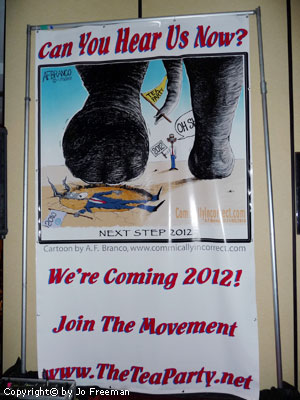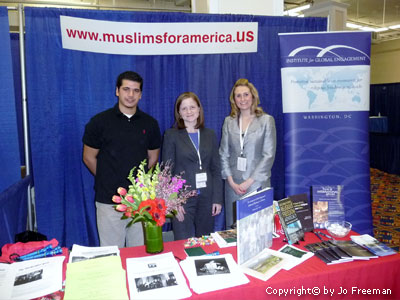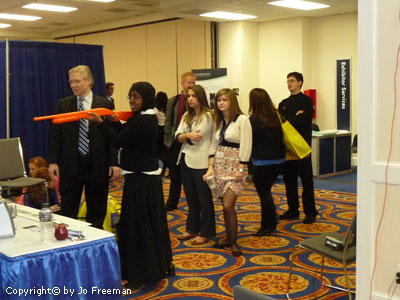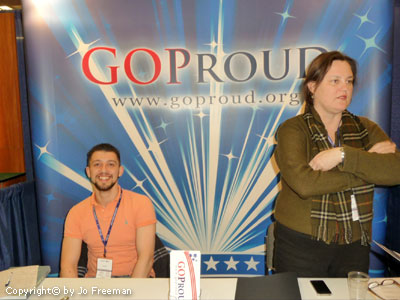|
|

by Jo Freeman
posted to SeniorWomen Web February 2011
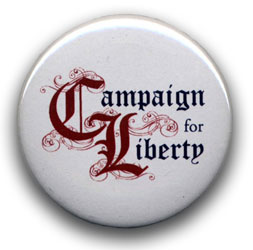 Youth swelled the ranks of the 38th Conservative Political Action Conference held in Washington, D.C. February 10-12. Estimates ran as high as fifty percent of the 11,000 people were under 25. Significantly more men than women wore student conference badges. Youth swelled the ranks of the 38th Conservative Political Action Conference held in Washington, D.C. February 10-12. Estimates ran as high as fifty percent of the 11,000 people were under 25. Significantly more men than women wore student conference badges.
CPAC has long actively recruited students and given them significant fee discounts, but this year’s crop was particularly bountiful. All of the ones I spoke to were subsidized. Many came in under the umbrella of a CPAC sponsor, others got money from their state or local Republican organization. Quite a few told me that their travel was paid for by their schools. CPAC provided room and board to those who volunteered for the many conference tasks.
Campaign for Liberty, founded by Cong. Ron Paul (R TX), brought in 1,200 supporters in order to repeat last year’s success in the straw poll. This year, thirty percent of the 3742 who voted said Paul was their first choice for the Republican nomination for President. Last year 31 percent of 2395 people gave Paul their vote. Former Massachusetts Governor Mitt Romney ran second in both years.
There was a big gap between these two and the other 13 names listed in the 2011 poll. Tea-Party favorite Michelle Bachmann received 4 percent of the vote, while Sarah Palin, the only other woman on the list, got 3 percent. Bachmann was a major speaker at CPAC; Palin did not come, though her PAC paid to be a co-sponsor.
Mississippi Governor Haley Barbour received 1 percent of straw poll votes, while relative unknown Herman Cain, the former CEO of Godfather’s Pizza, got 2 percent. Both were featured speakers. Barbour, who grew up in Yazoo, MS during the civil rights movement, gained some notoriety recently for his ignorance about racism in his home state. Cain, who grew up in Georgia, is black.
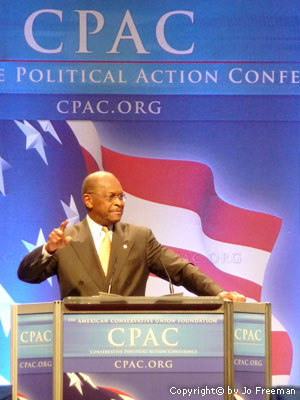 Herman Cain Herman Cain
Voting in the straw poll is optional, but all those young people had an impact. Although the American Conservative Union, which puts on CPAC every year, favors "traditional values" and a strong defense, only nine percent of those polled said that the former "comes closest to your core beliefs and ideology" and only six percent said it was "safety at home and abroad." The third choice, "individual freedom by reducing the size and scope of government" got 84 percent of the votes.
Speakers generally got a polite reception, but there were some exceptions. When former Defense Secretary Donald Rumsfeld came on stage to receive a "Defender of the Constitution" award, about half the audience cheered and the other half booed. Former Vice President Dick Cheney, who introduced him, got a warmer reception, with only about ten percent boos. But "draft dodger" and "where is bin Laden" shouted from the audience could be heard loud and clear.
Libertarian hero Ron Paul on the other hand was greeted like a rock star. The line outside the ballroom waiting to hear him speak was younger and much longer than the crowd for any other speaker, even such popular perennials as Ann Coulter.
As libertarians flowed into this year’s CPAC, traditional conservatives flowed out. The possibility that GOProud, a two-year-old conservative gay group, would return to CPAC in 2011 prompted several traditional conservative groups to stage a boycott. The Family Research Council, Concerned Women for America, and the Heritage Foundation said they would not participate if GOProud was present.
.jpg)
Their absence didn’t even make a dent. So many groups wanted booths in the exhibit area in 2011 that additional space had to be secured from the hotel. GOProud had its own booth again, but its level of participation was reduced from co-sponsor to "participating organization." That essentially meant that it paid less for fewer perks.
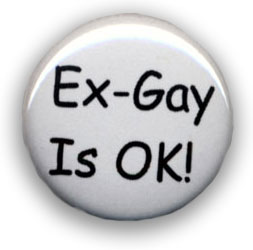 Indeed, it appeared that the publicity was beneficial. Throughout the three-day conference there was always a crowd in front of the GOProud booth, wanting to talk to the two people behind the table. There was never a crowd, and often not anyone, standing in front of PFOX –Parents and Friends of Ex-Gays– wanting to talk to them. Indeed, it appeared that the publicity was beneficial. Throughout the three-day conference there was always a crowd in front of the GOProud booth, wanting to talk to the two people behind the table. There was never a crowd, and often not anyone, standing in front of PFOX –Parents and Friends of Ex-Gays– wanting to talk to them.
The single best predictor of attitudes toward gay rights is age, and that was certainly evident at the 2011 CPAC.
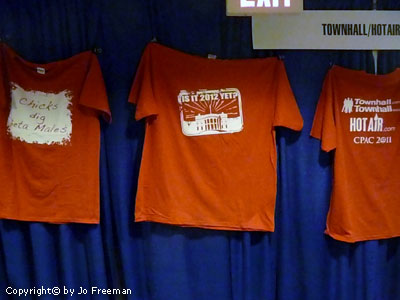 The sentiments on the middle t-shirt were shared by all
The sentiments on the middle t-shirt were shared by all
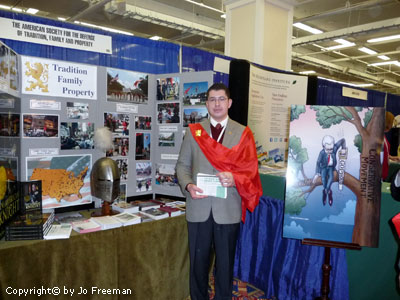 One of the few traditional values groups
One of the few traditional values groups
that didn't boycott CPAC in 2011.
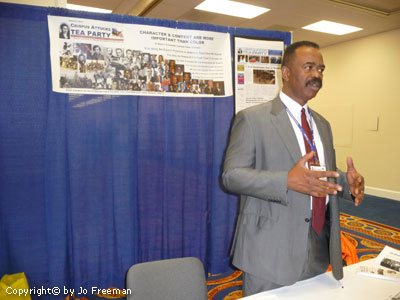 One of several Tea Party booths,
One of several Tea Party booths,
each with its own perspective.
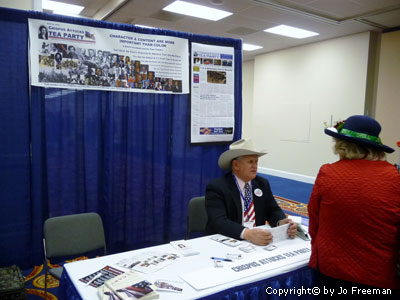
©2011 Jo Freeman for SeniorWomen.com
|
|

.jpg)

